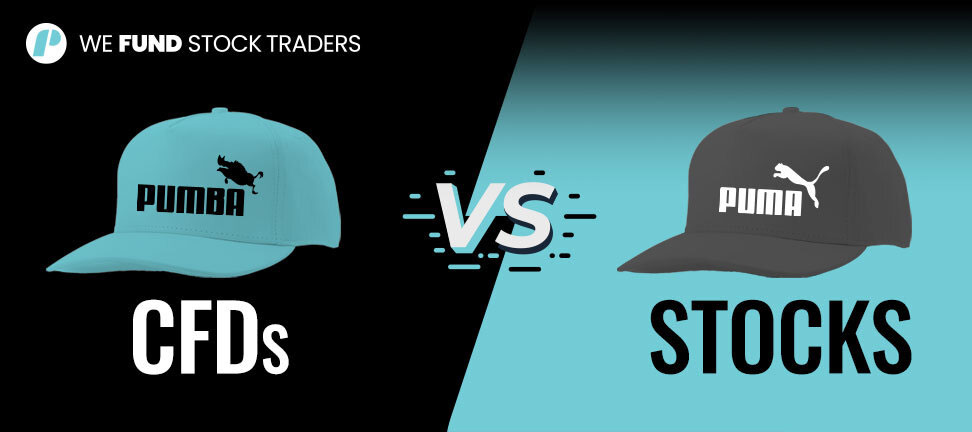
CFDs vs. Stocks – Introduction
As participants in the financial markets, investors and traders are constantly on the lookout for vehicles that offer the best potential for profits. Among the myriad options available, trading CFDs (Contracts for Difference) and trading stocks stand out as two of the most popular choices.
Each method comes with its unique set of advantages and disadvantages and it’s up to traders to choose and study a method suitable to them, based on their risk tolerance, strategy, and objectives.
In this article, we’ll discuss the main pros and cons of CFDs vs. Stocks trading so that you can evaluate what’s better for you as a trader and for your strategy.
Let’s start by looking at what CFDs are and what differentiates them from one another.
Key Notes:
- Stocks represent ownership in a company.
- CFDs are derivative contracts
What are CFDs and Stocks?
Before we delve into the advantages and disadvantages, it’s crucial to understand the basics of each trading method.
Stocks
Stocks are assets that represent ownership in a company.
When you buy stocks of a company, you are actually buying a portion of that company (a share) while speculating on (and rooting for) its future growth and success.
Naturally, as the company’s value grows, so does the value of each of its shares; stock traders and investors make profits through the stock price appreciation and the dividends that same companies pay quarterly to their shareholders.
CFDs
CFDs, on the other hand, are derivative products that allow traders to speculate on financial markets such as stocks, forex, indices, commodities, and crypto without owning the underlying asset. Rather than investing in the company directly (as for stock trading), CFD traders speculate on whether an asset’s price will rise or fall in the future.
Essentially, a CFD is a contract between a trader and a broker to exchange the difference in the price of an asset from when the contract is opened to when it is closed.
To compare stock and CFD trading, and identify the best option for you, let’s take a quick and schematic view at their main pros and cons.
CFDs vs. Stocks: Pros and Cons
Pros and Cons of Trading Stocks
Pros
Ownership Rights
Buying stocks gives you ownership in a company, including voting rights and dividends, which can be particularly appealing for long-term investors.
Potential for Long-Term Growth
Historically, the stock market has offered significant returns over the long term, making it an attractive option for building wealth.
Transparency and Regulation
Stock markets are highly regulated, offering investors a level of protection and transparency not always available in derivatives trading.
No Leverage Risks
Traditionally, stock trades are made with large capital and without leverage which means investors are not exposed to the risks of losing more than their initial investment.
Cons:
Higher Capital Requirement
Unlike CFD trading, buying stocks outright typically requires more capital, potentially limiting the ability to diversify across many stocks or asset classes.
Less Flexibility in Short Selling
Short selling stocks can be more complicated and expensive – especially for retail traders – due to borrowing fees and restrictions.
Market Accessibility
Accessing international stocks may require multiple brokerage accounts, which can somewhat complicate the trading process.
Stamp Duty and Taxes
Depending on the country they trade from and its legislations, stock traders often incur stamp duty (or equivalent) and other transaction taxes. This increases the cost of trading and reduces profit.
Key Notes:
- Stock and CFD trading’s pros and cons should always be considered before creating a strategy.
- Leverage can mean higher profit but also higher risk and larger losses.
- Day traders – and small timeframe traders in general – should also consider the extra cost incurred while trading CFDs
- The stock market is better regulated than the CFD’s but it usually also means higher tazation.
CFDs Pros
Leverage
Let’s start with the big one. CFD trading offers access to higher leverage than traditional trading. This allows traders to open larger positions with a relatively small amount of capital, potentially increasing returns on investment. However, it’s important to remember that while leverage can amplify profits, it can also magnify losses.
Market Access
CFDs provide traders with easy access to a wide range of markets (including international markets), without the need for multiple brokerage accounts. This allows for diversified trading strategies across different asset classes.
Going Short is Easy
Unlike stocks, where short selling can be cumbersome and expensive, CFDs allow traders to easily take short positions and profit from falling markets.
No Stamp Duty
In many jurisdictions, trading CFDs does not attract stamp duty since you are not taking ownership of the actual assets, which can result in cost savings.
CFDs Cons
Risk of Leverage
While leverage can magnify profits, the downside risk is significantly higher than trading without it. It’s also possible to lose more than your initial investment, especially in volatile markets.
Overnight Charges
Holding a CFD position overnight can result in charges, which can eat into profits over time, making it less suitable for long-term investing.
Market Spread
CFD traders must pay the spread, which is the difference between the buy and sell price. These costs can impact profitability, particularly for those trading the smaller time frames
Less Regulatory Protection
In most countries, CFD trading is less regulated than stock trading, potentially exposing traders to risk linked to their brokerage company as well as the volatility of assets’ prices
Choosing between trading CFDs and stocks depends largely CFDs offer leverage and easy market access but come with higher risks, especially from leverage and less regulatory oversight. Trading stocks, while generally requiring more capital, provides ownership, potential for long-term growth, and greater regulatory protection.
The picture that emerges from all of this is that the right choice between the two should depend on the trader’s risk tolerance, strategy, and goals…. however… records tell us a whole different story.
CFD’s over Stocks
The number one reason retail traders choose to trade CFDs instead of stocks is the leverage.
There is no doubt about it and, to be fair, it’s understandable. It is definitely wrong, make no mistakes, but it is understandable.
Traditionally, retail traders have a much smaller account than smart money. Statistics show that a great number of retail traders have accounts under $1000 and, since they are the ones who tend to use the highest leverage, it also shows that around 80-90% of them lose it within the first year.
Stocks over CFD’s
The number one reason why retail traders choose to trade stock rather than CFDs is for their reluctance (and maybe fear) to use leverage in their trades and having to learn the right risk management skills required to limit the associated risk. This, however, often may mean that these traders won’t see their accounts grow by much for a very long time.
The solution for both these types of traders, – even at the cost of repeating myself – is Trade The Pool.
With a stock trading prop firm like TTP behind you, you won’t have to worry about your account being too small to make a profit because you’ll be trading TTP’s money. And I assure you, their account is not small.
You won’t have to worry about using astronomical leverage to make yourself some money, TTP has thought of that. TTP shares their pool of funds with their traders so that you’ll always have enough bullets for your trading guns.
Risk management? TTP made that easy too.
You’ll be given clear and simple money management rules to follow which, even on their own, will make you a much better trader. TTP publishes great articles and tutorial material that can teach anyone the ins and outs of stock trading. You’ll be invited to regular live streams where you’ll be able to watch and interact with TTP staff. Just… just take a look at the website now, there is so much more!
If you liked this post make sure to share it!






